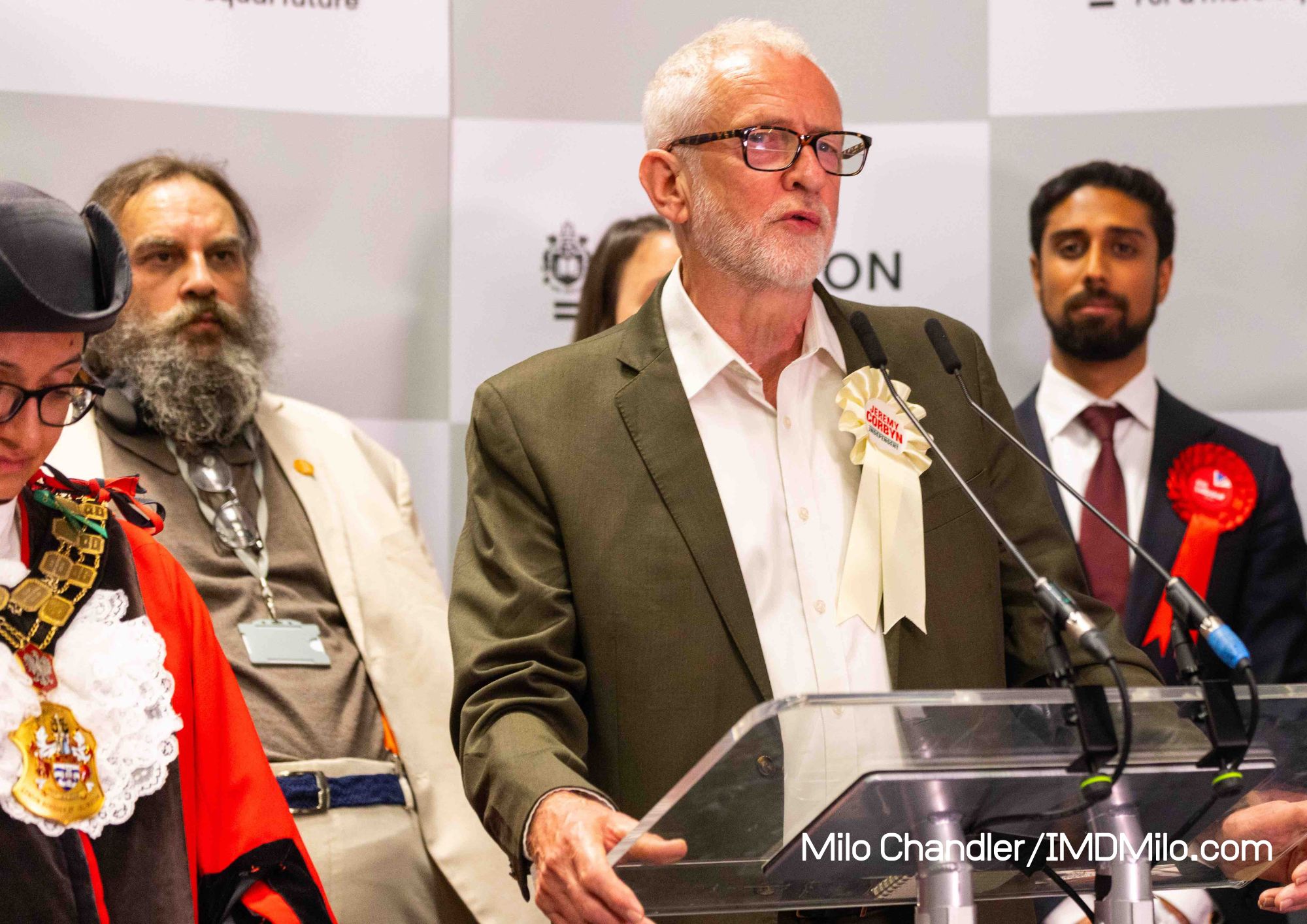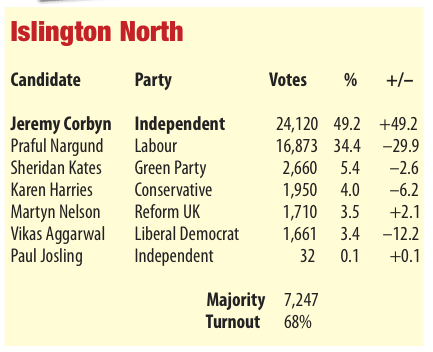It’s eleventh heaven for Corbyn as his invincible election run goes on as an independent candidate
'People powered' campaign sees huge get out the vote operation
Friday, 5th July 2024 — By Isabel Loubser

Jeremy Corbyn makes a speech after defeating Praful Nargund, right
AND after all that, Jeremy Corbyn won again.
For the eleventh time in a row, voters in Islington North chose the veteran as their MP – but for the first time as an independent candidate.
While Labour under Sir Keir Starmer’s leadership were heading to power, the final score announced at the Islington Tennis centre this morning (Friday) was a different story.
It showed Mr Corbyn’s contest with Labour candidate Praful Nargund wasn’t even that close – a margin of victory of more than 7,000 votes.
Huge numbers of supporters poured into the constituency yesterday (Thursday) for a “get out the vote” campaign.
Mr Nargund also had streams of supporters on the doorstep in a fight to the finish. He had brought Labour grandees such as Lord Peter Mandelson, Lord Tom Watson and Dame Margaret Hodge in to help.

Mr Corbyn has represented the area in parliament for 41 years – largely as a Labour MP but was blocked from standing again for the party. Labour had a 26,000 majority to play with but the great unknown had been how Mr Corbyn’s personal popularity would play out in the polling booths.
The answer came in the huge cheers which erupted from his team when his victory was confirmed.
In an emotional speech after his victory was announced, Mr Corbyn said: “I am humbled and proud, and very grateful to the people of Islington North who I have represented for so long, and who have taught me so much. I owe my life and my learning and my abilities entirely to the people of Islington North.”
Following six weeks of campaigning, in which Mr Corbyn’s campaign had to start from scratch with no data or party machinery to support it, the long-time MP thanked his “incredible team” for all their hard work.
He said: “Our campaign was a positive one. Our campaign did not get into the gutter of politics, as is happening too often in this country. Ours is a positive campaign trying to bring hope to people who are in housing stress, who are homeless, who are going through mental health difficulties, who are worried about their futures.”
Referencing the 11 rallies he had held in the lead-up to voting day, Mr Corbyn added: “This was a grassroots campaign, a grassroots campaign that isn’t going to disappear, isn’t going to go away, it has brought together people from all walks of life, from all ethnic communities and languages, and all ages in a determination to get something better in our society.”
The votes were already visibly piling up for Mr Corbyn as early as half past midnight.
From their huge smiles, it was clear that his campaign team was feeling positive, and at around 3am there were rumbling rumours that Mr Corbyn was on course for his shock win. In a poll by Survation published last week, it was forecast that the Labour candidate would receive 43 per cent of the vote, with Mr Corbyn on course to win only 29 per cent.
In the end, Mr Nargund’s 16,873 votes was less than half the amount Mr Corbyn collected when he last stood as a Labour candidate back in 2019. Labour had said that it was having thousands of conversations on the doorsteps, and this was given as a reason for their candidate declining invitations to appear at hustings events on topics including the NHS, housing, and the environment.
The Tribune made a large number of requests to interview Mr Nargund but each were rebuffed. At the same time as giving limited access to news publications to set out his stall, his team complained of misinformation on the less regulated social media.
Mr Nargund said today: “I’m proud to have run a genuinely positive campaign, one that has been full of joy, smiles and hope for a better future for Islington North, and for our country.
“Of course there were tough times, and I would be lying if I said it was easy to hear and read things about me in this campaign that simply weren’t true. Sadly these sort of tactics are rapidly becoming a regular part of our politics now – and that can’t be good.”
Mr Corbyn, first elected to the House of Commons in 1983, said he would not be put off by his former party’s attempts to oust him.
“I had that problem when I was leader of the Labour Party. There were quite a lot of people who were trying to oust me then,” he said. “I’m quite used to the complications, and nuances, and nastiness of the House of Commons. It doesn’t bother me. It doesn’t affect me. I know why I’m there, I know why the people put me there, and I know what my job is when I am there.”
Mr Corbyn was stopped from standing for the Labour Party last year after his successor as leader, and now Prime Minister, Sir Keir Starmer, led a National Executive Committee motion against him.
At the time, Mr Corbyn was sitting in the House of Commons as an independent MP having lost the Labour whip in 2020 following his response to the Equality and Human Rights Commission’s inquiry into how complaints of anti-Semitism in the party were handled. Mr Corbyn had said “one anti-Semite is one too many, but the problem was also dramatically overstated for political reasons by our opponents inside and outside the party, as well as by much of the media”.
Mr Starmer said this comment played down the problem. Mr Starmer had himself commissioned a separate inquiry into the issue, led by Martin Forde KC.
The silk’s findings said: “Some anti-Corbyn elements of the party seized on antisemitism as a way to attack Jeremy Corbyn, and his supporters saw it simply as an attack on the leader and his faction – with both ‘sides’ thus weaponising the issue and failing to recognise the seriousness of antisemitism.”
In May, there was anger from some local Constituency Labour Party (CLP) who claimed it was “undemocratic” that they were stopped from choosing their own candidate after a process in which Mr Nargund was chosen without a selection contest. The party then said Rishi Sunak’s snap election call meant it had to rush through his appointment.
It was revealed last week that 72 members of the local constituency Labour Party had either left the party to campaign for Mr Corbyn or been expelled whilst doing so.
Mr Corbyn told the Tribune that his win should send a message to new prime minister Keir Starmer that “democracy matters, people matter, inclusion matters”.
Mr Corbyn said: “My problem with the Labour manifesto is that it’s so weak on the economic issues, it’s so weak on the issue of raising taxation for the very richest.”
Meanwhile, the Green Party came in third place with 2660 votes, followed by the Conservatives on 1950, Reform on 1710, and the Liberal Democrats on 1661.